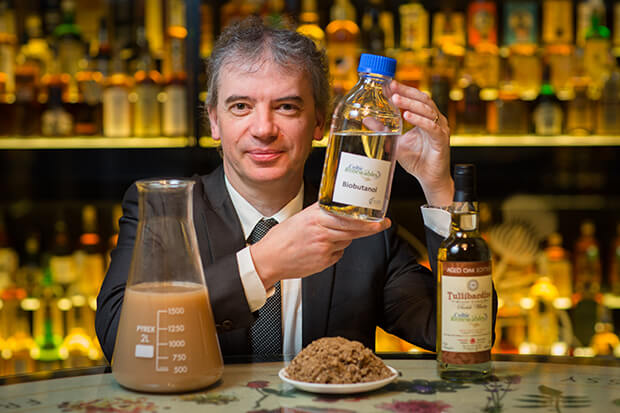Whisky is the new fuel propelling cars of the future

The Iron Lady, Margaret Thatcher once said, "You must have whisky to give you energy."
She may very well have been right as a Scottish startup just last week became the first company to successfully fuel a car using whisky. Yes, you hear it correctly, Whiskey, or more accurately, a whisky residue biofuel.
Professor Martin Tangney, the founder and president of Celtic Renewables, said:
"My fingers were crossed, I have to confess. We physically poured a bottle of [alcohol] butanol into the car, but the scale of this could be huge."
The whisky biofuel is produced using both draff, which are sugar-rich kernels of barley used to bring about fermentation in the whisky making process and pot ale, the copper-containing yeasty liquid left after distilling the whisky.
The malt whisky industry produces almost 750,000 tonnes of draff and 2 billion litres of pot ale each year in Scotland alone which means plenty of waste product from the whiskey industry that could be utilised as bio fuel.
John Torrance, the distillery manager at Tullibardine Distillery in Perthshire which is working with the startup, said:
"Right from the outset when Celtic Renewables approached us, we could see the game-changing potential of a new fuel created from our by-products."
The team involved in the biofuel trial used a hire car which they had delivered earlier that week. They drained the existing fuel from the car the night before the test.
"The test run shows that we know we could make it. The blueprint just needs to be replicated."
Celtic Renewables is now looking to build a demonstration centre within the next 18 months and as such, they are endeavouring to secure additional funding on top of the £9m funding it received from the Scottish Government.
Prof Martin Tangney said biofuel had an important role to play in efforts to reduce reliance upon petrol and could work in tandem with the shift towards electric cars.

Earlier this week, Volvo announced plans to become the first major car manufacturer to go all electric by 2019, when every new car in its range will have an electric powertrain available. Mr Tangney said went on to say,
"Only since the Fifties have we become this oil guzzling nation, but we won't replace oil with a single thing. We need to pull together everything we can and electric cars are one way we can [reduce oil consumption needs]"
"With electric cars, though, there's an infrastructure network needed. For biofuel you wouldn't even know it had been mixed in,"
"You still have to take all the cars off the road before you can go fully electric as well, and, with electricity, where is that power coming from? How are we going to meet the energy demands we’re adding on?"
Under the Paris climate deal, which US President Donald Trump withdrew from earlier this year, the EU is looking to introduce a new target for renewable energy to account for 27pc of energy use by 2030.
Ireland will no doubt sign up to any agreement reached by the European Union in its effort to bring in more renewable energy.
(As always, if you or a family member are considering buying a used car, don’t buy until you run a car check report with MyVehicle.ie where you will find out the true history of the vehicle.)

Author

Justin Kavanagh
Justin Kavanagh is a recognised leader
in automotive intelligence and vehicle
data supply to the entire motor industry.
He has almost 20 years experience in
building systems from the ground up.
As the Managing Director of Vehicle
Management System, he understands the
need and importance of trustworthy and
reliable vehicle history and advice to
both the trade and the public.
Follow me on LinkedIn